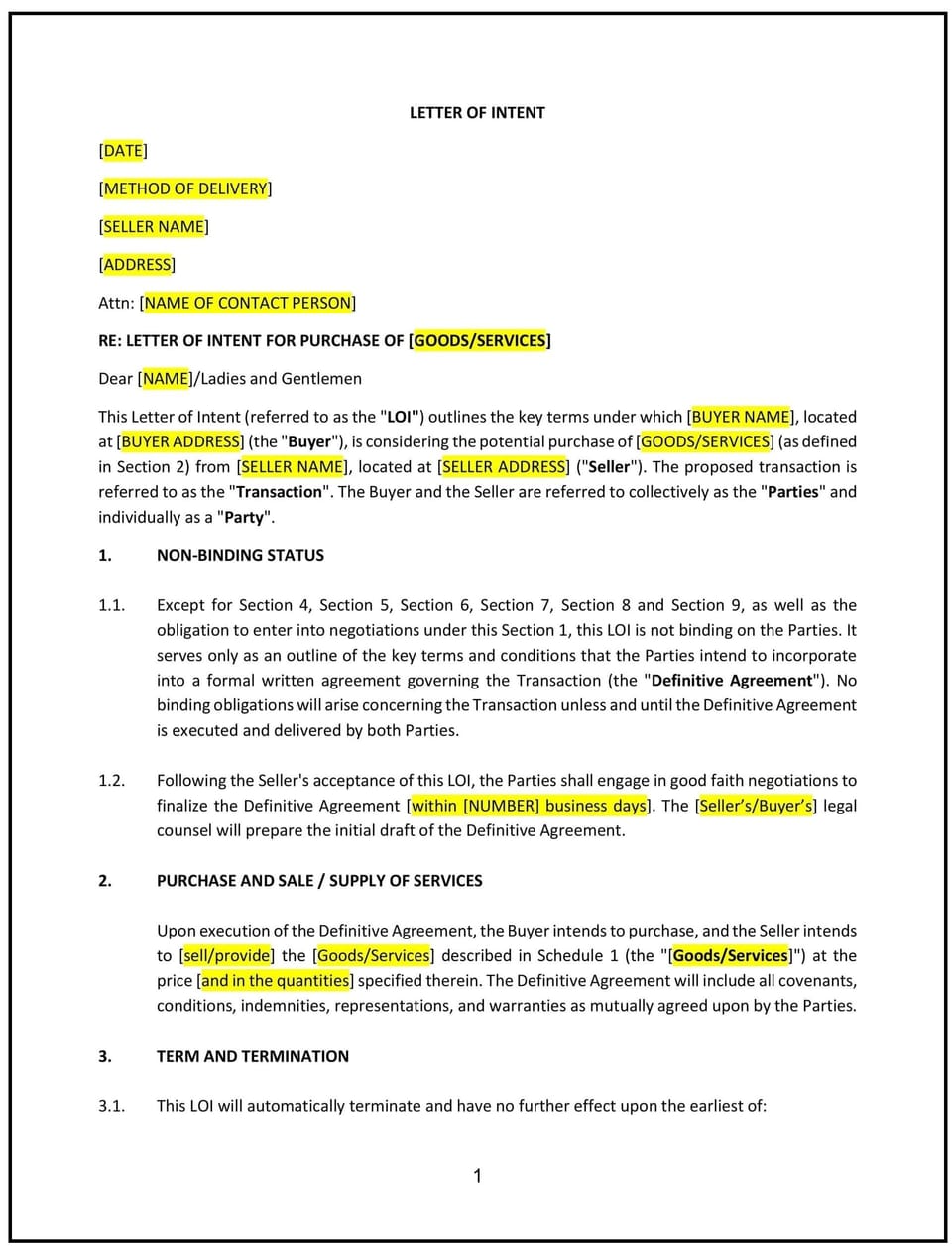Letter of Intent (LOI) (California): Free template

Letter of Intent (LOI) (California)
A Letter of Intent (LOI) is a non-binding document that outlines the preliminary terms and conditions of a proposed agreement between two or more parties. In California, LOIs are commonly used in industries such as technology, entertainment, real estate, and healthcare to establish a framework for future negotiations. California’s innovation-driven industries make LOIs particularly useful for businesses looking to formalize their intentions before entering into a binding contract.
An LOI ensures that all parties are on the same page regarding key terms, such as pricing, timelines, and responsibilities. For example, a Silicon Valley-based tech startup might use an LOI to outline the terms of a partnership with a software developer, while a Los Angeles-based real estate developer might use it to propose the purchase of land for a new project. A well-drafted LOI fosters trust and clarity, paving the way for a successful partnership.
Tips for drafting and maintaining a Letter of Intent in California
- Clearly state the purpose of the LOI: Specify that the document is non-binding and intended to outline the preliminary terms of a future agreement. For example, state that the LOI is a “statement of intent” and not a legally enforceable contract.
- Include key terms and conditions: Outline the proposed terms, such as pricing, timelines, and responsibilities. For instance, if the LOI is for a real estate transaction, include the purchase price, closing date, and any contingencies.
- Address confidentiality: Include a confidentiality clause to protect sensitive information shared during negotiations. For example, state that all discussions and documents related to the LOI must remain confidential.
- Specify governing law: Indicate that California law will govern the LOI. This ensures that any disputes related to the LOI will be resolved according to California’s legal framework, including adherence to the California Civil Code.
- Include a termination clause: Specify the conditions under which the LOI can be terminated. For example, state that either party can terminate the LOI with written notice if negotiations fail to result in a binding agreement.
- Regularly review and update: Periodically review the LOI to ensure it reflects the current state of negotiations. For example, if the parties agree to new terms, amend the LOI to include these.
Frequently asked questions (FAQs)
Q: What should a Letter of Intent include in California?
A: It should include the purpose of the LOI, key terms and conditions, confidentiality provisions, governing law, and termination clauses. Additionally, it should specify that the LOI is non-binding.
Q: How does California law impact Letters of Intent?
A: Under California law, LOIs are generally considered non-binding unless specific provisions, such as confidentiality or exclusivity clauses, are explicitly stated as enforceable. Parties should ensure clarity to avoid unintended legal obligations.
Q: Can a Letter of Intent be terminated early in California?
A: Yes, if the LOI includes a termination clause, either party can terminate the document with reasonable notice. The terms should specify any conditions or procedures for termination.
Q: What industries commonly use Letters of Intent in California?
A: Industries like technology, entertainment, real estate, and healthcare frequently use LOIs in California. For example, a tech company might use an LOI to propose a joint venture, while a real estate developer might use it to outline the purchase of property.
Q: How can businesses ensure compliance with California laws in Letters of Intent?
A: Businesses should ensure their LOIs comply with California’s contract laws, including the California Civil Code and Business and Professions Code. Regular updates to the LOI are also essential to reflect evolving negotiations.
This article contains general legal information and does not contain legal advice. Cobrief is not a law firm or a substitute for an attorney or law firm. The law is complex and changes often. For legal advice, please ask a lawyer.


